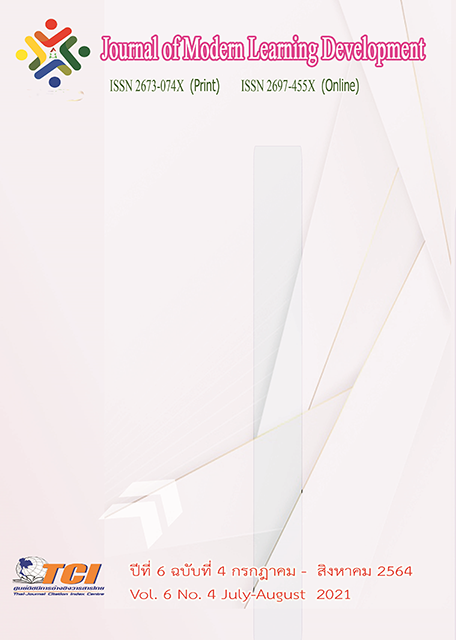An Analytical Study of the Belief of Merit-De Merit in Buddhism towards the Way of Buddhist Life in Mueangpia Sub-district Municipality Kutchap District, Udonthani Province
Main Article Content
Abstract
The purposes of this research were; 1) to study the belief of merit-demerit in Buddhism 2) to study the belief in merit-demerit of the Buddhists in Muengpia Municipality and 3) to analyze the belief in kmerit-demerit in Buddhism towards the Buddhists in Muengpia Municipa;ity. It was the qualitative research and the informants were Buddhist monks, officials, state workers and people in Muengpia municipality including 25 subjects by using the depth-interviewing and proposing the research results by descriptive analysis.
The research results were found that the belief in merit-demerit in Buddhism is that a merit means the leaven or expansion, swollen, relief and to be the purification of mind, to be tgoodness including the physical, verbal and mental behaviors . The merit can be classified into the two great categories, that is, 1) means the wholesome to reach Vivatta, that is, to be the round of rebirth 2) or means the wholesome to reach vivatta, that is, the wholesome going to Nibbana with the ultimate intelligence . One who receives the step of this merit will not be born again.
The demerit means the badness, that is, to cause the troublesome and to lead people to way of suffering in accordance with the Buddhist teaching. It can be classified into two categories, that is, 1) is the bad side of Dhamma or evil, inferior, mean, dirty, and sentimentality having in the human nature who associate with passion, that is, ignorance, desire, attachment, greed, hatred etc. 2) is that thing results from the performance with unwholesome volition of people who have the basis from the mentality covered by that is, the inside defilements that lead to commit that evil kamma by depending on the three sense-doors, namely, the physical door, verbal door and mental door that result in the different results in accordance with the weight or light kamma.
The situation of the belief in merit-demerit in Buddhism towards the Buddhists in the Muengpia Municipality was found that For the belief in merit-demerit, merit is the goodness of physical, verbal and mental behaviors while demerit is the evil leading to the way of ruin 2) the belief in the heaven and the hell is that one who commits evil will go to the hell after his death 3) For the belief of the law of Kamma is that the beliefs in the four faiths, that is, to believe in the law of Kamma, the results of Kamma, Kamma belonging to all sentient beings and the Buddha 4) to believe in the principle of Dhamma, to do good and to avoid an evil.
The analysis of the belief in merit-demerit in Buddhism towards the Buddhists’ life in Muengpia Municipality was found that the four aspects of results are; 1) for aspect of mentality, to hold the Triple Gem as the mental refuge, to observe the precepts, to practice meditation, to make the mind calm, joyfulness, to make merit by giving alms, it will make the spiritual happiness when one commits an evil, he will have suffering 2) For the physical aspect, to walk up and down will make the body strong, to practice meditation will make the face bright and to observe the eight precepts and practice Dhamma will make more progress 3) for the intellectual aspect, to listen to Dhamma, to recite mantra and to understand the Buddha’s teaching and to apply that Dhamma for daily life and 4) for the social aspect, to remove the temple, to get rid of trashes, to clean the roads, to donate the blood, to assist the poor children, to donate the white clothes for corpses, coffins and to take care of the state personnel, it will make the community strong and harmonious
Article Details
References
กลุ่มวิทยาลัยครูภาคใต้. (2526). สุราษฎร์ธานี. สงขลา: กลุ่มวิทยาลัยครูภาคใต้.
พระกัณหา กนฺตสีโล (อนุอัน). (2559). การศึกษาเชิงวิเคราะห์คติความเชื่อเรื่อง บุญ-บาป ที่มีต่อวิถีชีวิตของคนอีสาน : ศึกษากรณีอำเภอแกดา จังหวัดมหาสารคาม. วิทยานิพนธ์พุทธศาสตรมหาบัณฑิต สาขาวิชาพระพุทธศาสนา. บัณฑิตวิทยาลัย: มหาวิทยาลัยมหาจุฬาลงกรณราชวิทยาลัย.
พระธรรมปิฎก (ป.อ. ปยุตฺโต). (2542). เรื่องที่คนไทยควรเข้าใจให้ถูกต้อง. (พิมพ์ครั้งที่ 7). กรุงเทพมหานคร: โรงพิมพ์บริษัท สหธรรมมิก จำกัด.
พระพรหมคุณาภรณ์ (ป.อ. ปยุตฺโต). (2554). พจนานุกรมพุทธศาสตร์ ฉบับประมวลธรรม. (พิมพ์ครั้งที่ 34). กรุงเทพมหานคร: บริษัท เอส.อาร์.พริ้นติ้ง แมสโปรดักส์ จำกัด.
พระพรหมคุณาภรณ์ (ป.อ. ปยุตฺโต). (2564). พจนานุกรมพุทธศาสน์ ฉบับประมวลศัพท์. ออนไลน์. สืบค้นเมื่อ 12 มกราคม 2564. แหล่งที่มา: http://84000.org/tipitaka/dic/v_seek.php?text=วัฏฏ.
พระมหาสมคิด เหลาฉลาด. (2542). ความเชื่อเรื่องบุญและบาปกับพฤติกรรมเชิงจริยธรรมของนักเรียนระดับมัธยมศึกษาตอนปลายในเขตกรุงเทพมหานคร. วิทยานิพนธ์สังคมสงเคราะห์ศาสตรมหาบัณฑิต. บัณฑิตวิทยาลัย: มหาวิทยาลัยธรรมศาสตร์.
มหาจุฬาลงกรณราชวิทยาลัย. (2539). พระไตรปิฎกภาษาไทย ฉบับมหาจุฬาลงกรณราชวิทยาลัย. กรุงเทพมหานคร: โรงพิมพ์มหาจุฬาลงกรณราชวิทยาลัย.
สมศักดิ์ ชินภา. (2555). ความเชื่อเรื่องบุญ บาปตามแนวทางพระพุทธศาสนาของผู้ต้องขังเรือนจำกลางนครราชสีมา. วิทยานิพนธ์พุทธศาสตรมหาบัณฑิต สาขาวิชาพระพุทธศาสนา. บัณฑิตวิทยาลัย: มหาวิทยาลัยมหาจุฬาลงกรณราชวิทยาลัย.
หลวงเทพดรุณานุศิษฏ์. (2518). ธาตุปฺปทีปิถา. กรุงเทพมหานคร: มหามกุฎราชวิทยาลัย.
ผู้ให้ข้อมูลสำคัญ
เจ้าอธิการทองปาน ปญฺญาวโร (สนองผัน). (24 มกราคม 2564). ศึกษาวิเคราะห์ความเชื่อเรื่องบุญ-บาปในพระพุทธศาสนาที่มีต่อวิถีชีวิตชาวพุทธในเทศบาลเมืองเพีย อำเภอกุดจับ จังหวัดอุดรธานี. (พระอธิการกฤษณะ วรธมฺโม, ผู้สัมภาษณ์).
พระครูสุวัฒนาภิรม กวิสฺสโร (ปานนอก). (24 มกราคม 2564). ศึกษาวิเคราะห์ความเชื่อเรื่องบุญ-บาปในพระพุทธศาสนาที่มีต่อวิถีชีวิตชาวพุทธในเทศบาลเมืองเพีย อำเภอกุดจับ จังหวัดอุดรธานี. (พระอธิการกฤษณะ วรธมฺโม, ผู้สัมภาษณ์).
พระอธิการมณเฑียร เตชธโร (วรรณา). (24 มกราคม 2564). ศึกษาวิเคราะห์ความเชื่อเรื่องบุญ-บาปในพระพุทธศาสนาที่มีต่อวิถีชีวิตชาวพุทธในเทศบาลเมืองเพีย อำเภอกุดจับ จังหวัดอุดรธานี. (พระอธิการกฤษณะ วรธมฺโม, ผู้สัมภาษณ์).
บัวผัน ชุมแวงวาปี. (27 มกราคม 2564). ศึกษาวิเคราะห์ความเชื่อเรื่องบุญ-บาปในพระพุทธศาสนาที่มีต่อวิถีชีวิตชาวพุทธในเทศบาลเมืองเพีย อำเภอกุดจับ จังหวัดอุดรธานี. (พระอธิการกฤษณะ วรธมฺโม, ผู้สัมภาษณ์).
ภัณธิรา กาญจนแก้ว. (27 มกราคม 2564). ศึกษาวิเคราะห์ความเชื่อเรื่องบุญ-บาปในพระพุทธศาสนาที่มีต่อวิถีชีวิตชาวพุทธในเทศบาลเมืองเพีย อำเภอกุดจับ จังหวัดอุดรธานี. (พระอธิการกฤษณะ วรธมฺโม, ผู้สัมภาษณ์).
วัชรี เกษสว่าง. (27 มกราคม 2564).
วารี ชนะมาร. (27 มกราคม 2564).
วิสิฐศักดิ์ พิจิตรศิริ. (27 มกราคม 2564).
สามา ยานิพันธ์. (9 กุมภาพันธ์ 2564).
สิริวรรณ เพ็งมีศรี. (9 กุมภาพันธ์ 2564).
อุดมพร ชัยชนะ. (8 กุมภาพันธ์ 2564).
อดิศร เพียภิรมณ์. (8 กุมภาพันธ์ 2564).


